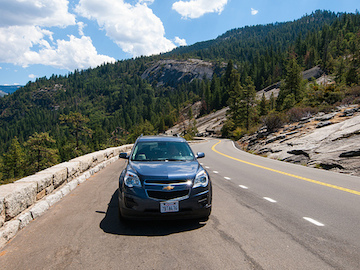
The summer is a great time to leave the big city and take a road trip to somewhere more open, maybe the beach or the mountains, or a simple visit with family members in a far off place. Road trips are a fun, and often cheaper, way of taking a vacation.
Although a car accident is probably the last thing on your mind as you set out, and the last thing you want on your mind, the complications of a car accident out of town can quickly ruin a vacation. Not knowing who to call or what repair shop to take your car to can make an already stressful situation unbearable.
Whether you are taking the family car or renting a vehicle for an out-of-town vacation, there is some information you might want to know before you step on the gas.
This article should answer some of the most pressing questions that arise after a car accident on vacation such as whether your insurance will cover out-of-town repairs on your own vehicle and whether rental car repair is covered by insurance.

First, it is vital that you obtain a thorough police report after the accident, especially if another distracted or negligent driver caused the accident. There is a good chance that, if you are far from home, you will not encounter the people at the scene of the accident again.
A detailed report will serve as your reference to the nature of the accident, and could hold evidence vital to proving someone else was at fault. If your or any of your passengers are injured, make sure to also keep a close record of those injuries and how serious they are. This information will be vital to your case if you choose to hold the responsible party liable for the damage done to your car and your life.
Let’s address the issue of getting in an accident with a rental car: all in all, an accident is an accident and the process is similar but, because you do not own the vehicle, there are some unique steps to take and information to be aware of.
With a rental, you will likely need to deal with s bit of additional paperwork. As soon as you can, you should contact the rental company and inform them of what happened. Most rental cars are equipped with a sticker in the glove box that has emergency information on it.
Once you get in touch with the company, ask them about the next steps. Take a close look at your own insurance plan and any insurance that may be provided by the rental company. If you have collision and comprehensive coverage within your policy, it usually protects the any car you rent. Also make sure to inform your insurance company about any additional insurance you purchased at the time of your rental.
When all is said and done, your insurance company has the responsibility of paying the rental company for damage done to the car (if your policy has first-party coverage). The company is entitled to having repairs covered on their vehicle as soon as possible.
The most inconvenient aspect of this situation is what is called “loss of use.” This means that if you don’t have rental coverage on your active insurance policy you will owe rental fees to the company even if you are no longer driving the car. For example, if it takes 3 days to repair damages, you will have to pay the fee for those three days even though you didn’t drive the car anywhere.
To sum it all up: make sure to communicate with your insurance company, the rental company, and read the fine print. Doing all this will keep the paperwork, and ideally the stress, at a minimum.

When it comes to your own car, getting in a serious accident far away from home can make the accident process just that much more difficult, especially when it comes to repairs.

Knowing that your vehicle is being repaired by a body shop or professional you trust is comforting, but when an accident happens away from home it is likely that you’ll have to find a repair shop locally. Most insurance companies won’t pay to have a damaged car towed back to the hometown.
If possible, consider a temporary repair. If your car has relatively serious damage, but a minor repair will get it home to a place you trust, discuss that option with your insurance company.
Trusting a body shop that you’ve never taken your car to, and likely won’t take your car to again, can be difficult. The repairs could turn out to be low quality. There are some options for ensuring your car
is repaired with integrity.
A lot of car insurance carriers have contracts with specific collision repair shops that covers a nationwide warranty. This means that by using one of these contracted shop you can receive a warranty on the repairs, allowing you to bring attention to problems that may pop up regarding repairs to your vehicle.
The cost of any repair adjustments that are made within such a warranty will most likely be transferred back to the shop that originally did the repairs. If you have questions about this, it is best to contact your insurance company or refer to your insurance policy.
A car accident is scary, especially far from home. If injuries occur, it throws an even bigger wrench in to a situation that is already difficult. If you or one of your family members is seriously injured, you’ll have to take care of medical bills on top of all the paperwork and repairs associated with the vehicle.
If you have suffered in a car accident on vacation, a car accident that was caused by the negligence of another, consider contacting an attorney about your case in addition to your insurance or rental company.
